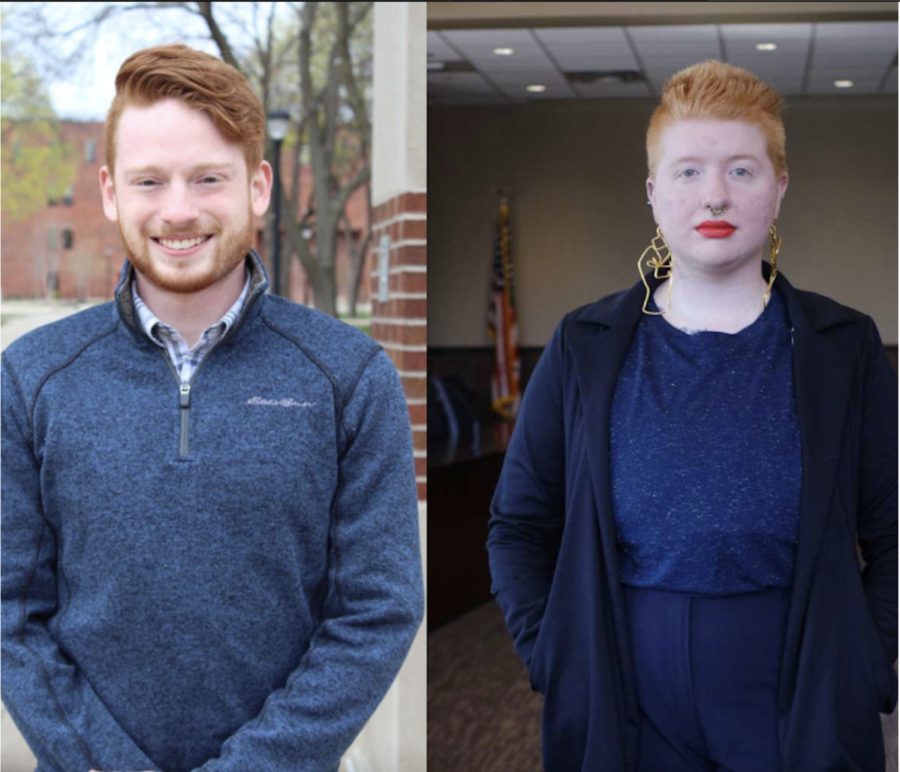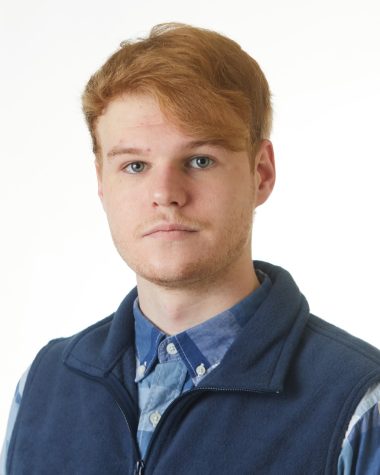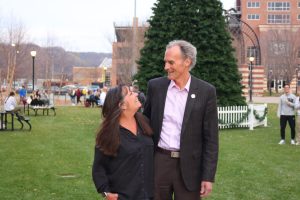Student Association leaders share final statements as 2021-2022 academic year ends
May 13, 2022
With the end of the 2021-2022 academic year comes the end of the terms for this year’s Student Association (SA) leaders. On Wednesday, May 10, SA leaders Jared Zwettler (president) and K.C. Cayo (vice-president) agreed to discuss their experiences in SA over the past year, some of the things they worked on, and any advice they had for future student leaders.
Tell us about your experience as the leaders of Student Association.
Zwettler: “This was certainly a unique experience. In my role, I had the opportunity to collaborate with individuals from across campus on a number of projects, manage a team of seven directors, and build relationships that help students move issues forward. In that respect, this has been a very rewarding year. However, like K.C. said, this year has not been without stress. I have struggled to set boundaries between this role, my academics, and other campus commitments. This position has been the most stressful one that I have held, and the stress, time commitment, and general exhaustion that this role brings were major factors in my decision to not run again.
On balance, the stressful times significantly outnumbered the rewarding ones. That is not necessarily a bad thing, but I think that it is indicative of our roles on campus. It is our job to put out fires within SA, to collaborate to the extent that we are able, clearly communicate the limits of our power and risks associated with certain plans, and simultaneously encourage and empower students to be successful in their endeavors.
I learned a lot about management through this role and how to work effectively as a team leader. Much of my role involved developing a cohesive plan for our cabinet, then working with each individual cabinet member to develop projects that fit into that plan. It was very rewarding to see my cabinet members grow into their roles and develop some amazing projects. This was by far the most rewarding and positive part of my position.”
Cayo: “This was a mixed bag, honestly! On one hand, it was very exciting to be the first point of contact for administrators, other UWL faculty/staff, and community members to make when looking for a pulse on the student voice, as humbling as it is to be asked to represent over 10,000 students on our own. On the other hand, I was expected to be a student and an administrator in every space I am in, whether it be Senate meetings, committee meetings, or the classes that I pay for. I checked my e-mails every 5-10 minutes and was generally stressed all the time. It was an amazing experience, and I learned a lot about navigating cishet normative spaces as a nonbinary queer person (not to mention the fact that I was actually invited to said spaces, which was a unique experience all on its own), but it is a job that there are no breaks from.
We worked 40+ hours a week for the same pay and were expected to prioritize our positions over our academics most of the time–this was never something explicitly told to us, of course, but it was something we realized within the first month, and that pressure never really let up. I’m glad I got to be the vice president of SA, and therefore the president of the Senate, and I loved getting to mentor the senators and watch them grow, but I am burned out and relieved that the position is over. It is thankless work considering how much that we do behind the scenes that nobody on campus will ever hear about.”
What were some of the issues that you were motivated to work on this year?
Zwettler: “One of the issues that I campaigned on was budget transparency, and I think we have made some positive steps in this regard. We have been working tirelessly to gather budget information and make it available on the SA website for AIDAC and SUFAC, but there is more work to be done. In order to make information accessible to all folks, narratives are necessary in addition to the raw data. This is one area where we can continue to improve in the future.
For a long time, SA has also had issues with information continuity. Frequently students will continue working on the same projects, even if all of the pieces are in place for something to happen. This is partially due to administrative inaction (or slow action) but it is also due to the fact that information is frequently lost when student leaders graduate. This year I have been working hard to break that cycle by centralizing all of the SA information that I have to provide some form of continuity for the next administration. I enjoy doing this work behind the scenes, and it is my sincere hope that with greater continuity, students will be able to accomplish more in the future.
A final issue that I was motivated to work on was head of class registration for student-athletes. We are behind the times on this issue. Every other school in the WIAC has some form of early registration for athletes (whether that is head of class or first-day priority). However, we provide virtually no institutional support for student-athletes to take classes around rigid practice and competition schedules. It is all up to individual professors and students to arrange something when there is a clear solution to the problem that has been shown to have little impact on the rest of the student body. This problem was left unresolved at the end of my term, and I would encourage students to continue advocating for this important campus policy.”
Cayo: “This answer is going to look a little different for me than it will for Jared, but one thing I realized by week two in my position is that all the goals and projects I wanted to work on as an individual were going to be put on the back burner because of my duty as the president of our legislative branch. Instead of getting to work on budget transparency and accessibility concerns on campus, 99.9% of my duties were prepping for Senate meetings, leading Senate meetings, brushing up on Robert’s rules for the millions of questions I would need to answer in said meetings, reading over resolutions written by said senators to make sure they made sense/were appropriate, become an expert on the institution at large for said senators, appoint senators to committees, and then rearrange the committee lists as scheduling conflicts came up.
I did not expect how much of my job was going to be dealing with committee appointments and their subsequent vacancies–students are busy people and the senators are unpaid, and thus have other obligations, which I respect. Regardless, keeping up with committees was exhausting. The issues I had campaigned on quickly pivoted to appointing senators to vacant positions (COVID-19 participation meant that we started the school year with only half the Senate; it took until week thirteen for me to fill all the seats), training them all on Robert’s rules, teaching them how to be senators, helping run resolution workshops and training (in meetings and outside of them), and becoming the person who could answer any question about the university and who to talk to depending on what issues my senators brought to me.
My entire job rotates around the Senate as a primary concern and the whole of student government as a secondary one! I would work with Jared as issues came up during the year, but unless there was a pressing obligation that required both of our attention, my job was to run Senate meetings. Jared and I learned early on that if we tried to do elements of each other’s jobs too often that we got tired and annoyed with each other, so we worked hard to set distinct boundaries in our working relationship.”
What accomplishment(s) are you most proud of in your role?
Zwettler: “The largest achievement of this year has most certainly been obtaining the funding for a Sustainability Program Manager. This was not something that I anticipated would be on the table for this year, and I am extremely thankful for the relentless advocacy of the Joint Committee on Environmental Sustainability, Students for Sustainability, and the Green Fund Coordinators. This project is over ten years in the making, and I am very proud to have a role in this accomplishment.
A second accomplishment from my administration was Earth Fest. Director of Staff Kate Lochner and Sustainability Director Grace Lopez-Johnson did all of the work here to set up the event, coordinate with organizations, and provide a vegan/vegetarian meal for free for students. This event was massively successful, and we ran out of free meal tickets with an hour remaining in the dinner! I am very proud of my team for putting this together, and I think this shows what people can do when they are given room to try new things and when leaders support them in their roles.”
Cayo: “It’s impossible not to think of our success in advocating for a Sustainability Program Manager (functionally the same position as a Sustainability Coordinator)! Senator and Green Fund Coordinator Andrew Ericson, Jared, and I worked for the better part of the spring semester with Vice-Chancellor Bob Hetzel in creating the position, ironing out all the wrinkles (e.g. since students will be funding 50% of it, who does the position answer to, and do we have say over the job description?), and then finally drafting a Memorandum of Understanding that Jared signed at our last meeting of the year. Considering this is a position that students have been championing for at least the last decade, I am delighted that we were able to find money in the budget. Out of everything we have worked on this year, this position is not only the most visible but will have the longest-reaching effects long after we are gone.”
What would you like to see the Student Association accomplish in the future?
Jared: “One of the biggest areas for improvement is in the area of student outreach. This is one goal that was perpetually on our list of goals, and it is unfortunately a place where I believe that we fell short of expectations. This problem is not unique to our campus, and K.C. and I had various discussions with other student government leaders from across the UW system, all of whom are facing this exact problem. Student engagement is a difficult but necessary aspect of student government.
Additionally, I would like to see important events brought back now that things are opening up more. In past years, SA has hosted lobbying trips to the state capitol, connected women in politics with prospective candidates for office through ElectHer, and worked with other groups to bring engaging and important speakers to campus. All of these are events that should be top priorities now that in-person events are coming back.”
Cayo: “One of our senators this year worked on priority registration for student-athletes, and I have a feeling that this discussion will be back next year (or in as many years to come as it takes to get it). This year’s Senate laid a strong foundation for continuing this conversation and I am excited to see them do it! In addition to this, I would love to see SA continue to work on public relations and student outreach. This is not a unique issue for our student government (from our conversations with other student government leaders across the UW System, this appears to be something we all struggle with), but one that we still need to work on. Our public relations directors each year do a wonderful job, but it shouldn’t be the position of just one person, especially if they are also full-time students. In pre-COVID years we did tabling in the Union and in the Whitney Center, which was fairly successful, and I would love to have that come back in the future!”
Do you have any advice for future Student Association leaders?
Zwettler: “My piece of advice is to set effective boundaries. It took me an entire semester to learn that my work-life balance was unhealthy and needed to be changed immediately. I would hope that the new folks in our positions will take this advice and routinely check in with each other to ensure that neither of them are burning out.
I would also recommend setting up appointments with the Counseling and Testing Center (CTC). Despite misinformation that has been floating around, it is possible to get an appointment set up in about a week. The CTC really helped me to manage the stress that was associated with this position, and provided me with a space where I could process things that have happed within my role as President and outside of it.
Student leaders are frequently expected to do it all, but that is not sustainable for anybody. Put your academics first, learn how to say no to opportunities, and effectively delegate work when possible. The first few months are fun, but if you don’t stop and take a break, this job will wear you out. Sometimes you need to take a break in order to be the best student advocate that you can be.”
Cayo: “Make boundaries between the president and the vice president. I cannot stress this enough; you will get burned out immediately if you try to do too much of each other’s jobs. The president of SA has zero allocated speaking rights in the Student Senate unless a senator decides to yield to them, and therefore they should not have anything to do with the Senate outside of giving weekly reports and answering a question or two when necessary. Running Senate meetings is only the Vice President’s job; if Jared had tried to take on Senate responsibilities in addition to what he was already working on, he would have quit (or I would have killed him). Your roles require you to support each other, but they are also incredibly independent, and it is unreasonable to ask a student to do both positions in full. Please delegate and set boundaries accordingly, for your own mental health.
Additionally, I would recommend scheduling appointments with the CTC right away regarding boundary setting, alleviating and navigating burnout, time management between classes and your positions, and just having time without the other for you to take up space in a way that is meaningful for you. Your positions are going to be trying and working with leadership can be draining, especially since your primary constituencies are different, and making time for yourself is going to make it or break it for your time in these positions.
[Future leaders], please do not ruin SA’s relationship with shared governance groups on campus and with the administration. We have the healthiest relationship with the aforementioned entities right now than we ever had, and shared governance is a privilege under Wisconsin State Statute 36.09(5), not a right. Fostering a healthy working relationship will only help you, and it will also help you sharpen the tools you need to navigate a system that is already skewed against you as a student. You don’t need to agree with them all the time, nor do you need to compromise on your values and opinions, but pick your battles and please pick be respectful. Students are not their only constituency on this campus, unlike you, and you need to understand that before you engage in discourse with them. You’ll thank me later.”







